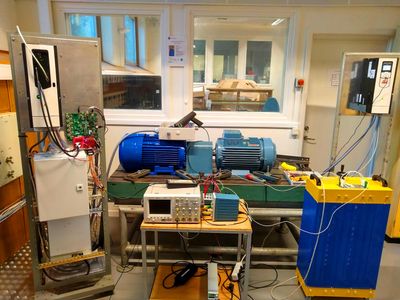- Electromagnetism and electromechanical models with application to rotating electric machines
- Principles of electromechanical energy conversion.
- Dc machines and their electric drive system.
- Rotating magnetic fields and AC windings.
- The space vectors and the dq0 reference frame.
- Operating principles for synchronous machines.
- Operating principles for asynchronous machines.
- Introduction to three-phase electric drive systems.
EJ2201 Electrical Machines and Drives 6.0 credits

The course deals with the principle of operation and modelling of electrical machines (motors and generators), togheter with the basic control structures used in electric drives. The content of the course is shaped in such a way that students with a background in physics, electromagnetics and electrical circuits should be able to grow their knowledge and understand how different types of electrical machines operate, how to choose an electrical machine and a drive for a specific application, and what are the inherent differences in using a machine with or without a frequency converter. Practical experience in laboratory is part of the course flow.
Information per course offering
Information for Autumn 2026 Start 24 Aug 2026 programme students
- Course location
KTH Campus
- Duration
- 24 Aug 2026 - 11 Jan 2027
- Periods
Autumn 2026: P1 (3 hp), P2 (3 hp)
- Pace of study
17%
- Application code
11006
- Form of study
Normal Daytime
- Language of instruction
English
- Course memo
- Course memo is not published
- Number of places
Min: 1
- Target group
- Open for all programmes as long as it can be included in your programme.
- Planned modular schedule
- [object Object]
- Schedule
- Schedule is not published
Contact
Course syllabus as PDF
Please note: all information from the Course syllabus is available on this page in an accessible format.
Course syllabus EJ2201 (Autumn 2021–)Content and learning outcomes
Course contents
Intended learning outcomes
After passing the course, the student shall be able to
• describe the basic principles of electromechanical conversion
• explain the principles of rotating magnetic field generation through the construction of AC windings
• explain the operating principles of DC machines, synchronous machines and induction machines
• use analytical models for describing the operation of DC machines, synchronous machines and induction machines
• use the space vector theory and the reference frame theory to describe the operation of AC machines
• describe the most important parts of a DC electric drive and a three-phase electric drive.
Literature and preparations
Specific prerequisites
Knowledge in Electric Power Systems, 6 higher education credits, equivalent completed course EJ1200.
Recommended prerequisites
• Electrical circuit analysis (for example EI1110 Electrical circuit analysis, extended course or EI1120 Electrical circuit analysis for the energy and environment program)
• Electromagnetic theory (for example EI1220 Electromagnetic theory E or EI1225 Electromagnetic theory, introductory course for energy and environment)
Literature
Examination and completion
Grading scale
Examination
- LAB2 - Laboratory work, 0.5 credits, grading scale: P, F
- PROA - Project work, 5.5 credits, grading scale: A, B, C, D, E, FX, F
Based on recommendation from KTH’s coordinator for disabilities, the examiner will decide how to adapt an examination for students with documented disability.
The examiner may apply another examination format when re-examining individual students.
If the course is discontinued, students may request to be examined during the following two academic years.
Examiner
Ethical approach
- All members of a group are responsible for the group's work.
- In any assessment, every student shall honestly disclose any help received and sources used.
- In an oral assessment, every student shall be able to present and answer questions about the entire assignment and solution.
Further information
Course room in Canvas
Offered by
Main field of study
Education cycle
Supplementary information
Replaces EJ2200.
In this course, the EECS code of honor applies, see:
http://www.kth.se/en/eecs/utbildning/hederskodex.